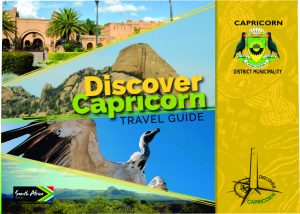 The Capricorn District Municipality, with its air of myth, legend and prehistoric civilization, is a popular ecotourism destination in Limpopo, with no shortage of natural, historical and cultural attractions. The district takes its name from the Tropic of Capricorn, one of the five major circles of latitude that mark maps of the Earth and which runs directly through this diverse landscape.
The Capricorn District Municipality, with its air of myth, legend and prehistoric civilization, is a popular ecotourism destination in Limpopo, with no shortage of natural, historical and cultural attractions. The district takes its name from the Tropic of Capricorn, one of the five major circles of latitude that mark maps of the Earth and which runs directly through this diverse landscape.
The region is dominated by mountains and forests but also includes the provincial capital of Polokwane (formerly Pietersburg), which is a popular stopover en route to the Kruger National Park and is one of the host cities for the 2010 FIFA World Cup. The city has a certain charm to it, whether it be from the wide, jacaranda-lined avenues or the architecture of times gone by that is so evident. Here visitors have plenty of cultural attractions to choose from such as the Bakone Malapa Northern Sotho Museum (015 295 2432), described as an open-air ‘living’ museum, where you can interactively
learn about Sotho culture and explore a traditional Sotho tribal village as it existed 250 years ago.
Demonstrations of traditional fire making, maize grinding and beer brewing can be seen throughout
the day and the craft shop sells handmade traditional items such as pottery, wood carving, bead work, traditional clothing, grass weaving, drum-making, hunting weapons and basketry at reasonable prices.
The Hugh Exton Photographic Museum (015) 290 2186 is found in a Dutch Reformed church from the 19th century and houses a 23 000-strong cultural and historical photo collection of Polokwane and its people. The Polokwane Game Reserve, just 15km south of town, is one of the biggest municipal-owned game reserves in South Africa. At just three hour’s drive from Johannesburg, the reserve is both accessible and popular and visitors can drive a large portion of it in one day.
The reserve has a number of walks, including a one-day 20km hiking trail with overnight accommodation and there are the frequent sightings of white rhino and other game – a total of 21 species in all. The Blouberg Nature Reserve has the world’s largest breeding colony of Cape Vultures – situated on the southern cliffs of Blouberg Mountain – and regular sightings of this raptor and Ruppell’s Vulture are more than likely, with the Cape Griffon a bit more rare.
Gold was first discovered in South Africa was on a farm named Eersteling, which was located near the village of Marabastad, 30km southeast of Polokwane. Mining started in May 1874 and continued
until the second Anglo- Boer War (1899 – 1902) when the mine was shut down. The Zion Christian Church headquarters are located at Zion City Moria in the Limpopo province. The ZCC was founded
in 1924 by Engenas Lekganyane and has gone on to become the largest African Initiated Church in southern Africa, with some 10-15 million members. As a Zionist organization, the ZCC is haracterized by an emphasis on divine and faith healing, purification rites, dancing, night communion, river baptism, the holy spirit, prophesying, and so on.
The Zebediela Citrus Estate is located in the Lepelle-Nkumpi Local Municipality within the district and is one of the largest citrus estates not only in the Limpopo province but also in the country. It all started back in 1918 when, over a nine year period, thousands of citrus trees were planted on a portion of the land. In 2003 the land was returned to its original owners, the Bjatladi community.
Of the fruit trees on the farm, expect to come across acres of navels, valencias and eureka lemons. Accommodation is available at the farm. The Polokwane Museum (015) 290 2183 building is from the beautiful Late Victorian style and was restored to its original splendour in 1986 when it was declared a
museum. Exhibits depict themes from all the different peoples and cultures in the Limpopo province of South Africa.
The Polokwane Smelter opened for production in March 2003 and at full capacity it is able to process 650 000 tons of concentrate from existing and new platinum mines on the Eastern Limb. After an accident resulted in the smelter shutting down in 2008, it reopened in 2009 and is building up to full capacity. Alldays is a small town in Limpopo and is very popular among rock climbers, Big Five game viewers and hunters. It is here that some little-known wonders such as the giant baobab tree and the massive wild fig and nyala trees grow wildly and abundantly. Another of Capricorn’s small towns is Houtbosdorp, known for its stunning forests, lakes and waterfalls. Both towns are wonderful places to
explore – or to rest and unwind for the weekend.
 CDM Municipality
CDM Municipality
